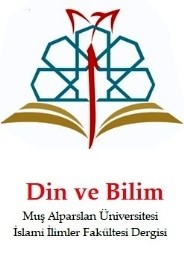
Din ve Bilim - Muş Alparslan Üniversitesi İslami İlimler Fakültesi Dergisi
Yazarlar: ["Mehmet Burak ÇAKIN"]
Konular:-
DOI:10.47145/dinbil.1295978
Anahtar Kelimeler:Klasik Türk Edebiyatı,Mesnevî,Yûsuf u Züleyhâ,Hamdullâh Hamdî,Baba
Özet: The father is one of the most influential characters on a person's upbringing, education, and personality development. The vital role of the father in terms of the individual development and socialization of the child and the transfer of culture and value to the child has been important in all societies. The importance of father and fatherhood has been reflected in the literary works of societies since ancient times. In accordance with this situation, it is seen that great importance is attached to the role of the father in the works given in classical Turkish literature and the fathers mentioned in the works are generally role models. Yusuf and Zulaikha masnawis are among the works in which the emphasis on the father is seen the most in this tradition. In Yusuf and Zulaikha’s, it is seen that especially the father role of Yaqub is handled in accordance with the story's truth. This study discusses how the father role is handled in the masnawi of Hamdullah Hamdi, one of the most beautiful examples of Yusuf and Zulaikha in classical literature. In addition to being one of the most beautiful works written on this subject, Hamdi's masnawi has special importance because the author describes himself and his father with the representations of Prophet Yusuf and Yaqub. For this reason, in this study, besides the father's role in Hamdi's work, some aspects mentioned in the work and the similarities between the poet's own life and his father were tried to be revealed. There are three father figures in Hamdi's work. These are Yaqub's father Ishaq, Yusuf's father Yaqub, and Zuleikha's father Taymus Shah. In the work, the story generally begins with the Prophet Ishaq. For this reason, the Prophet Ishaq appears as the first father. Since Ishaq is the eldest of the family, he is in a position that is mentioned with respect and affection in the later parts of the work and should be worthy of him. Taymus Shah, another father in the work, comes to the forefront as the father of a daughter. Taymus Shah, whose only child is Zuleikha, cares for his daughter and does his best for her happiness. The owner of the most important father role in the work is the Prophet Yaqub. Yaqub is mostly emphasized in the work as the father of Yusuf. For all three fathers in the work, the births of their children are depicted as a source of happiness and peace. Again, the fathers are personally interested in everything from their children's education to their future and even their personal care. Fathers, who are deeply saddened by their children's troubles, make great efforts to save them from the bad situations they are in. Fathers are interested not only in their children's happiness in this world but also in their children's happiness in the hereafter, and they try to educate them in this direction and do not miss their prayers for them. Despite this love and compassion of fathers for their children, it is seen that children also have a great love and respect towards their fathers. In the study, first of all, it was determined how these fathers took place in the work, and then father-child relations were discussed. Again, in the study, the effort of the poet to reflect himself and his father in his work is revealed by comparing the stories Hamdi tells about these fathers and the stories told about his father.